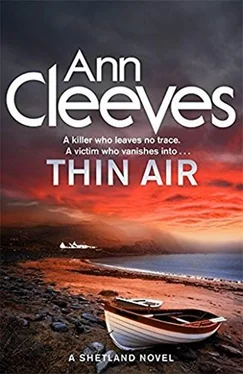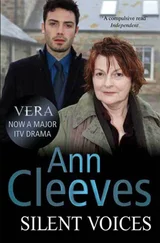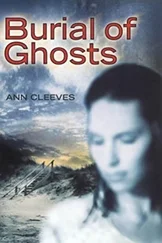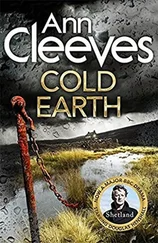‘Except that the iPhone from which she sent it wasn’t with her. It was found on the hill close to where you left your car.’
‘So the murderer is playing games then, you think?’ Willow thought it was the time of year for games.
Perez shrugged to show that he was reluctant to speculate. She was reminded of the old Perez and wanted to snap at him, And don’t you play games with me, mister. Just give me an opinion.
James Grieve was taking photographs, completely focused on his work and apparently unaware of any tension between them. He looked up suddenly. ‘You do realize that I can’t give you any cause of death until we move the body. I could have had a good night’s sleep in my own bed and come up first thing tomorrow morning.’
‘But then you’d have been deprived of our company this evening.’ Willow thought she could have stayed in North Uist, and felt again the relief of being away from the place, where she sensed her father’s disapproval eating into her confidence from the moment of her arrival.
‘Time of death?’ Willow knew she was wasting her time, but couldn’t help asking.
James Grieve glared. ‘Tell me when she was last seen, and when her body was found, and it’ll be somewhere between the two.’
‘You can’t blame a girl for trying.’ She flashed a grin at him, never quite sure when she was pushing him too far. ‘We’ll leave Sandy here, shall we, Jimmy, and have a word with your suspects?’
He led her down a slope and pointed out a low white house at the end of the track and right by the sea.
‘That’s Sletts, the holiday let where they’re staying,’ Perez said. ‘They were two couples, in Unst for a friend’s wedding. Professional thirty-somethings from London.’ He paused. ‘I haven’t given them any details yet, though they know that she’s dead. Mary Lomax, the community officer, is sitting with them. Perhaps I should have gone in earlier. They’ll be tense with waiting for information. Hostile. But I’m not sure where to start with them and so I waited for you. It’s almost as if they speak a different language. As if they’re aliens from a different world.’
‘And you think I’ll have more in common with them than you? You’re joking, aren’t you?’ She looked down at her jeans, bought from a charity shop and the hem let down so that they fitted, at the hand-knitted sweater with the hole in the elbow.
‘You won’t be intimidated.’ His voice was serious. ‘I can’t imagine you being intimidated by anyone.’
The compliment took her breath away for a moment, then she almost ran down the slope to the house below, her face turned away from him so he couldn’t see that she was blushing.
Inside three people sat round a dinner table, though it seemed that the meal had been more like a picnic. There was half a French loaf, some cheese still in its wrapper, a tub of hummus. They weren’t speaking. Willow understood what Perez meant about them being members of an alien species. It was the cut and shine of the hair and the quality of the casual clothes. There’d be no Oxfam-shop jeans here. She knocked on the door and walked straight in through the immaculate kitchen. This holiday house was far better equipped than her flat in Inverness. They turned round to stare at her. Still speechless. Then they saw Perez behind her and the questions came tumbling out, one after another, the voices a chorus of well-bred noise. A motherly woman sat in the corner knitting hand-spun yarn.
Willow held up her hands and the noise faded away. The Englishwoman, Polly Gilmour, stood up. She was blonde and pale. And fraught. ‘We’ve been here for hours with no news. No communication. Mary knows as little as we do. Somebody turned up an hour ago and took our mobiles and our laptops, and he said that you’d explain. We’ve been sitting here waiting for someone to come.’ She paused. ‘Oh God, someone needs to tell Cilla.’
‘Cilla?’
‘Eleanor’s mother.’
‘If you give us the number,’ Willow said, ‘we can do that.’
A solid bruiser of a man stood up. ‘What happened? Did she kill herself? There wouldn’t have been this fuss if she’d had an accident.’
‘And you are?’ Willow turned to him.
‘Her husband. Ian.’
‘I’m so sorry, Mr Longstaff. You shouldn’t have been asked to wait for so long without any information, but it’s hard in the islands when we have so few officers. I’m so sorry about the death of your wife.’ Willow looked for a reaction. None came. His face was blank. He was the sort of man who wouldn’t show emotion, and he’d had time to take in the information of his wife’s death. Willow wished she’d been here when he’d first been told.
‘How did she die?’ The words were as flat and hard as slaps.
‘We don’t know yet. The pathologist has flown in from Aberdeen. He’ll take her south tomorrow for a post-mortem.’
‘Was it suicide?’
‘It’s impossible to say at this point.’ Willow saw now that the three English people were out of their depth. They were accustomed to being in control of their lives. They were the ones who felt as if they were in alien territory. They’d come to Shetland expecting a great cultural experience, to meet the locals and experience the traditions. Then they’d expected that they’d all go home. They’d be full of stories to share with their friends in the smart cafes and wine bars, but like visitors to a zoo they’d be untouched by the stay. Instead when they returned to London their lives would never be the same again.
‘Who are you, please?’ It was the man who hadn’t yet spoken. Polly Gilmour’s partner. He had dark curly hair and an unfashionable beard, the sort of voice that made you think of public schools and smart universities. Polite enough, but confident that he’d be answered. His face was tanned and she wondered if he’d just come back from holiday.
‘My name’s Willow Reeves. I’m a chief inspector with the Serious Crime Squad based in Inverness, and I’ll be in charge of this investigation.’
‘You think Eleanor was murdered?’ It was the husband, aggressive now, his head thrust forward towards her. The regional accent was stronger. She wondered if he felt like an outsider in this company too.
She kept her voice calm. Grief took people in different ways. ‘It’s an unexplained death,’ she said. ‘We won’t know until Dr Grieve does the post-mortem what the cause might be.’
‘Where is she now?’ Polly asked.
‘Where she was found.’ Willow turned slowly to face the woman. ‘By the standing stone on the hill behind the house. She’ll be moved in the morning.’
‘Are you sure it’s her?’ It was the husband again. ‘We walked that way this morning looking for her.’
‘She was found by Lowrie Malcolmson,’ Perez said. ‘He could identify her. And if you searched along the cliff you wouldn’t have seen her. She’s lying in a small loch, hidden from the footpath.’
Willow thought Eleanor had probably been lying there since the early hours of the morning; even if the search party had looked in that area they must have missed her. On a fine Sunday in June a murderer wouldn’t take time to arrange the body so carefully when there might be walkers around. ‘We’ll need to take detailed statements,’ she said, ‘but that can wait until the morning. Try to get some rest.’ These people had already had time together to prepare any story. Another night would make no difference.
Out on the deck the light was fading. It was nearly midnight. Inside, Polly had lit candles on the table where they’d been sitting. Looking in at them through the window, Willow saw the English people as a beautifully composed painting. It could be a scene from a Parisian bar: Marcus Wentworth, with his dark hair and beard, leaning back on his chair to one side of the table, faced by the woman whose hair looked silver in the candlelight. The clutter of bread and fruit on the white cloth. And staring out, squat and brooding, the dead woman’s husband. What might the title be? Three Friends. Except, Willow thought, that Eleanor had been the person who had held the friends together and now they were almost three strangers, caught up with their own preoccupations.
Читать дальше












